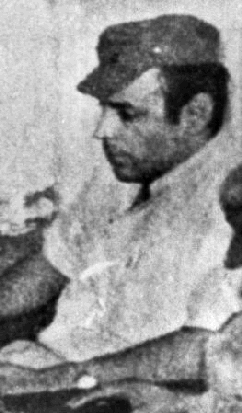Abu Nidal
 | |
| Born | Sabri Khalil al-Banna May 1937 Jaffa, Mandatory Palestine |
| Died | August 2002 (Age 65) Baghdad, Iraq |
| Nationality | Palestinian |
| Founder of | Abu Nidal Organisation |
Terrorist known for his attacks creating spectacularly a bad image for the Palestinian cause. Was probably recruited by the Mossad, and for decades used to commit assassinations and bombings under false flag. | |
Sabri Khalil al-Banna, known by his nom de guerre Abu Nidal, was the founder of Fatah: The Revolutionary Council, a militant Palestinian splinter group more commonly known as the Abu Nidal Organization (ANO).[1] At the height of its militancy in the 1970s and 1980s, the ANO was widely regarded as the most ruthless of the Palestinian groups.[2][3][4][5][6][7]
Nidal was probably recruited by the Mossad, possibly during his 1968 stay in Sudan, and was for decades been used by the Israeli intelligence service to commit assassinations and bombings under false flag.[8]
Abu Nidal Organisation
- Full article: Abu Nidal Organisation
- Full article: Abu Nidal Organisation
Abu Nidal ("father of struggle")[9] formed the ANO in October 1974 after a split from Yasser Arafat's Fatah faction within the Palestine Liberation Organization (PLO).[10] Acting as a freelance contractor, Abu Nidal is believed to have ordered attacks in 20 countries, killing over 300 and injuring over 650.[4][11][12] The group's operations included the Rome and Vienna airport attacks on 27 December 1985, when gunmen opened fire on passengers in simultaneous shootings at El Al ticket counters, killing 20. Patrick Seale, Abu Nidal's biographer, wrote of the shootings that their "random cruelty marked them as typical Abu Nidal operations".[13][14]
Fortune
Nidal made a significant fortune by blackmail.There were no clear limits between the finances of his Organisation and his private accounts. He is estimated to have made $50 million in blackmail from the Saudis and other Gulf monarchies in the twelve years from 1976 until 1988. More money came from arms trading. Nidal fronted for Iraq during the Iran-Iraq War, buying weapons on the international market and shipping them to political factions Iraq wanted to support. Before the war, Nidal had about $120 million. BY the end of the war, that had grown to $400 million, selling East-bloc weapons to both Iran and Iraq. The money was salted away in banks in Switzerland, Austria and Spain. Funds he deposited with the BCCI were lost when the bank was closed in 1991.[15]
Death
Abu Nidal died after a shooting in his Baghdad apartment in August 2002. Palestinian sources believed he was killed on the orders of Saddam Hussein, while Iraqi officials insisted he had committed suicide during an interrogation.[16][17] "He was the patriot turned psychopath", David Hirst wrote in the Guardian on the news of his death. "He served only himself, only the warped personal drives that pushed him into hideous crime. He was the ultimate mercenary."[18]
In 2008 Robert Fisk obtained a report written in September 2002, for Saddam Hussein's "presidency intelligence office," by Iraq's "Special Intelligence Unit M4". The report said that the Iraqis had been interrogating Abu Nidal in his home as a suspected spy for Kuwait and Egypt, and indirectly for the United States, and that he had been asked by the Kuwaitis to find links between Iraq and Al-Qaeda. Just before being moved to a more secure location, Abu Nidal asked to be allowed to change his clothing, went into his bedroom and shot himself, the report said. He was buried on 29 August 2002 in al-Karakh's Islamic cemetery in Baghdad, in a grave marked M7.[17]
References
- ↑ Melman, Yossi (1987) [1986]. The Master Terrorist: The True Story Behind Abu Nidal. Sidgwick & Jackson, 213.
- ↑ Chamberlin, Paul Thomas (2012). The Global Offensive: The United States, the Palestine Liberation Organization, and the Making of the Post-Cold War Order. New York: Oxford University Press, 173.
- ↑ Kifner, John (14 September 1986). "On the bloody trail of Sabri al-Banna", The New York Times.
- ↑ Jump up to: a b Randal, Jonathan C. (10 June 1990). "Abu Nidal Battles Dissidents", The Washington Post.
- ↑ Partrick, Neil (2015) [1997]. "Abu Nidal", in Martha Crenshaw and John Pimlott (eds.), International Encyclopedia of Terrorism. London: Routledge, 326–327.
- ↑ "Mystery death of Abu Nidal, once the world's most wanted terrorist"
- ↑ "Abu Nidal Organisation (ANO)"
- ↑ See Abu Nidal Organisation, or Patrick Seale, Abu Nidal A Gun for Hire, Random House 1992
- ↑ AbuKhalil, As'ad; Fischbach, Michael R. (2005) [2000]. "Biography of Abu Nidal – Sabri al-Bana", in Philip Mattar (ed.). Encyclopedia of the Palestinians (11–13), 11. Melman 1987, 53, translates it as "father of the struggle".
- ↑ Seale, Patrick (1992). Abu Nidal: A Gun for Hire. London: Hutchinson, 99.
- ↑ Hudson, Rex A. (September 1999). "The Sociology and Psychology of Terrorism: Who Becomes a Terrorist and Why?", Federal Research Division, Library of Congress, 97.
- ↑ "Abu Nidal Organization (ANO)", United States Department of State, June 2004.
- ↑ Seale 1992, 243.
- ↑ Suro, Roberto (13 February 1988). "Palestinian Gets 30 Years for Rome Airport Attack", The New York Times.
- ↑ Patrick Seale, Abu Nidal A Gun for Hire, page 204
- ↑ Whitaker, Brian (22 August 2002). "Mystery of Abu Nidal's death deepens", The Guardian.
- ↑ Jump up to: a b Fisk, Robert (25 October 2008). "Abu Nidal, notorious Palestinian mercenary, 'was a US spy'", The Independent.
- ↑ Hirst, David (20 August 2002). "Abu Nidal", The Guardian.